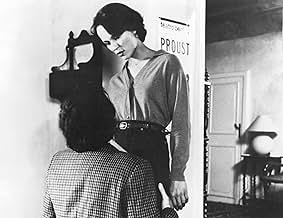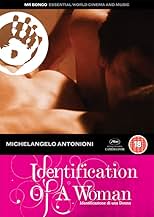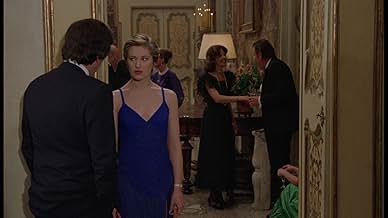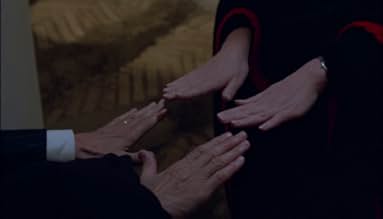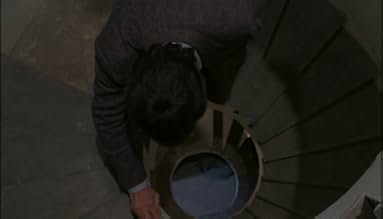IMDb RATING
6.6/10
3.5K
YOUR RATING
A director's wife leaves him. He pursues another woman who also departs. This inspires a movie idea about women's relationships. He searches for an actress to star in the film and his life.A director's wife leaves him. He pursues another woman who also departs. This inspires a movie idea about women's relationships. He searches for an actress to star in the film and his life.A director's wife leaves him. He pursues another woman who also departs. This inspires a movie idea about women's relationships. He searches for an actress to star in the film and his life.
- Awards
- 1 win & 5 nominations total
Enrica Antonioni
- Nadia
- (as Enrica Fico)
Giampaolo Saccarola
- The Gorilla
- (as Gianpaolo Saccarola)
Dado Ruspoli
- Mavi's Father
- (as Alessandro Ruspoli)
Pier Francesco Aiello
- Young Man at Party
- (as Pierfrancesco Aiello)
Carlos Alberto Valles
- Close-Up Man
- (as Carlos Valles)
Featured reviews
Possibly the most atmospheric film I ever seen, it made a huge impact when I first saw it, and that opinion has never changed. If there is one film that conveys the mystery of life this is it. It is also a highly evocative picture of Italy from the perspective of the upper middle classes in the late Seventies. Crying out for a DVD release as the photography was excellent too on the original film showings.
Antonioni's "The Passenger" is probably my favorite film. It's a singular work which manages to have the highest philosophical ambitions without seeming the least pretentious. That's not to say that Antonioni never seems pretentious. He sometimes is very much so, and this is a case in point. I wouldn't describe this as a good movie exactly- it's a bit too self-absorbed, with some lousy dialog and a howlingly funny leading man, who seems like an SNL parody of an Italian leading man. But having said that, it's still vintage Antonioni, and he was a master. For every moment that makes a fan wince, there are others of exceptional compositional beauty: street scenes in which "extras" take on inarticulable metaphysical weight, moments, such as a scene where the protagonist is lost in fog, that seem to depict the invisible. The theme of the film could seem misogynistic, and in a way it is. But really, this film is about the unknowability of the Other, and the way that black hole nonetheless illuminates Being.
First the good. The fog scene. OMG. Incredible. Even if you decide to skip this movie, you should try to find that scene and watch it. Next the bad: ouch dude my brain hurts.
"Identification of a Woman" was the last feature film by master director Michelangelo Antonioni before he suffered a debilitating stroke and lost his ability to communicate. It was also his long-awaited, eagerly-anticipated salivatorily-received return to the cinema of his native Italy after some 15 years making films in the UK & USA. This is a landmark for the fans, and as far as that goes I am... how does one say "fanboi" in Italian?
But wow, this is a difficult film.
Although the story is easy enough to follow (a director searches for the perfect female character for his latest movie whilst personally going through several women in his life), the plot is not the main focus of the movie. Rather, the main focus is on Antonioni's style of storytelling which has always been cryptic and deliberately confounding.
In this case it can be outright frustrating or even infuriating. This is because, unlike Antonioni's earlier Italian works that you probably love him for ("L'avventura", "La notte", "L'eclisse", "Red Desert"), here of course we don't have the wonderfully human Monica Vitti or any of the other interesting characters such as L;eclisse's boy-faced charmer Alain Delon or Red Desert's broodingly introspective Richard Harris. Here the characters are all deliberately wooden personifications of social tiers and personality types. While, yes, that successfully shifts focus to the theme of the film, it makes for a difficult movie watching experience.
Further complicating the experience are some explicit sexual scenes which can be disturbing to watch (a scene of a man aggressively pleasuring a woman with his hand, leaving nothing to the imagination) which was undoubtedly Antonioni's deliberate embracing of the new sexually explicit cinematic style of the 80s. Indeed, a prominent theme in many of his works is that new ways must be forcefully embraced even at the expense of losing our traditions.
So it all fits with what he's saying here. I won't argue with his presentation. I'll just say, wow that was difficult. Other reviewers have noted that you really have to watch this film twice. I'm sure I'll give it another go soon enough. I just need to rest my brain first.
"Identification of a Woman" was the last feature film by master director Michelangelo Antonioni before he suffered a debilitating stroke and lost his ability to communicate. It was also his long-awaited, eagerly-anticipated salivatorily-received return to the cinema of his native Italy after some 15 years making films in the UK & USA. This is a landmark for the fans, and as far as that goes I am... how does one say "fanboi" in Italian?
But wow, this is a difficult film.
Although the story is easy enough to follow (a director searches for the perfect female character for his latest movie whilst personally going through several women in his life), the plot is not the main focus of the movie. Rather, the main focus is on Antonioni's style of storytelling which has always been cryptic and deliberately confounding.
In this case it can be outright frustrating or even infuriating. This is because, unlike Antonioni's earlier Italian works that you probably love him for ("L'avventura", "La notte", "L'eclisse", "Red Desert"), here of course we don't have the wonderfully human Monica Vitti or any of the other interesting characters such as L;eclisse's boy-faced charmer Alain Delon or Red Desert's broodingly introspective Richard Harris. Here the characters are all deliberately wooden personifications of social tiers and personality types. While, yes, that successfully shifts focus to the theme of the film, it makes for a difficult movie watching experience.
Further complicating the experience are some explicit sexual scenes which can be disturbing to watch (a scene of a man aggressively pleasuring a woman with his hand, leaving nothing to the imagination) which was undoubtedly Antonioni's deliberate embracing of the new sexually explicit cinematic style of the 80s. Indeed, a prominent theme in many of his works is that new ways must be forcefully embraced even at the expense of losing our traditions.
So it all fits with what he's saying here. I won't argue with his presentation. I'll just say, wow that was difficult. Other reviewers have noted that you really have to watch this film twice. I'm sure I'll give it another go soon enough. I just need to rest my brain first.
This feels a little bit like "Antonioni For Dummies". Although there are some mysteries and ambiguities, for the most part it's rather plainly laid out and not as enigmatic as his more highly-regarded works. Which isn't to say it's a bad movie. It drags quite a bit, but there are some intriguing parts. The highlight is the fog-shrouded centerpiece of the film... a rather blunt metaphor, but still eerie and compelling. The ending is also a treat. The cinematography by Carlo Di Palma is excellent, perhaps even surpassing his work on RED DESERT. And the soundtrack, though it will probably sound dated to most, is full of stuff I like -- OMD, Tangerine Dream, Steve Hillage. Overall, the film is engaging, but only intermittently so. The first half is more rewarding with all its paranoia... things fizzle out more in the second part.
I think there are no such things as popular movies or intellectual films. there are good films and bad ones. Whether they are westerns, film noirs, comedies or action movies is irrelevant. some of them speak to you as if you were a nut-head, others as if you were able to share their vision and if necessary think by yourself, not mentioning others who would simply insult a 5-year old. This movie definitely falls in the second category. First of all it is visually rewarding. Antonioni is a painter in films and every scene, every shot is beautiful and interesting. As to the plot and characters, they are puzzling, for, as in all Antonioni's movies, they never act or react as expected. There is mystery, in every scene. It is so modern that not many films of today can compete. The love scene for instance is unrivaled in today's cinema and makes "Basic Instinct" look like sexual excitation seen through the eye of mickey Mouse. It's a film about creation, fatherhood, what it is to watch and to be watched. it's about cinema!
Did you know
- TriviaThe last feature film Michelangelo Antonioni made before his debilitating stroke.
- ConnectionsFeatured in Tonino Guerra: A Poet in the Movies (2008)
- SoundtracksThe Fire Inside
Written by Steve Hillage and Monique Giraudy (as Miquette Giraudy)
Performed by Steve Hillage
Published by Virgin Music Publishers
- How long is Identification of a Woman?Powered by Alexa
Details
- Release date
- Countries of origin
- Languages
- Also known as
- Identification of a Woman
- Filming locations
- Production companies
- See more company credits at IMDbPro
Box office
- Gross worldwide
- $1,605
Contribute to this page
Suggest an edit or add missing content

